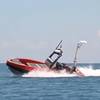Speechless
“The world will little note, nor long remember, what we say here, but it can never forget what they did here.”
It is the job of Maritime Reporter & Engineering News to deliver perspective from the maritime industry point of view. In a gross understatement, the world is a different place today. At press time, heightened security measures in the nation’s airports, ports and all borders were quickly evolving, and it can be assumed that the business of transporting goods to and from the United States will be a more lengthy, arduous and expensive task than ever before. Security, at least in the near term, will run at maximum levels. For example, the Port of New York and New Jersey has mandated, at least for now, that every ship will be escorted by two tugboats from the time the vessel enters the port complex until it reaches destination. “These may seem like extraordinary measures to members of the maritime community. These are extraordinary times,” said Admiral Bennis. With security now priority one, credible carriers that run clean operations with quality, well-equipped and -maintained ships will be positioned to prosper, while those who do not will wither.
On the military side, increased spending is not an “if” or “when,” rather an “on what.” The Pentagon could receive up to an additional $17 billion for the coming year, according to a report in the Wall Street Journal, driving the defense budget to the $345 billion range. U.S. Navy spending will undoubtedly rise, but it is not yet clear if the spending will be on big ships, smaller boats, or everything in between. Given the make-up of the “new enemy,” — small, elusive groups — referred to time and again by President George W. Bush, it could be reasoned that builders of medium to small, fast craft will be busy very soon.












